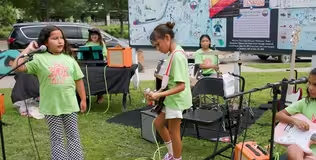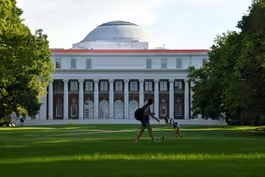
3 brothers attempt a record-setting row across the Pacific
Clip: 8/24/2025 | 8m 51sVideo has Closed Captions
Why three brothers are attempting a record-setting row across the Pacific Ocean
It’s a story of three brothers, a boat and thousands of miles of ocean. The Maclean brothers from Scotland are in the final stretch of their attempt to row nonstop across the Pacific from Peru to Australia. They’re going for more than a world record — they’re raising money for clean water projects in East Africa. John Yang spoke with the brothers when they were about 500 miles from Australia.
Problems playing video? | Closed Captioning Feedback
Problems playing video? | Closed Captioning Feedback
Major corporate funding for the PBS News Hour is provided by BDO, BNSF, Consumer Cellular, American Cruise Lines, and Raymond James. Funding for the PBS NewsHour Weekend is provided by...

3 brothers attempt a record-setting row across the Pacific
Clip: 8/24/2025 | 8m 51sVideo has Closed Captions
It’s a story of three brothers, a boat and thousands of miles of ocean. The Maclean brothers from Scotland are in the final stretch of their attempt to row nonstop across the Pacific from Peru to Australia. They’re going for more than a world record — they’re raising money for clean water projects in East Africa. John Yang spoke with the brothers when they were about 500 miles from Australia.
Problems playing video? | Closed Captioning Feedback
How to Watch PBS News Hour
PBS News Hour is available to stream on pbs.org and the free PBS App, available on iPhone, Apple TV, Android TV, Android smartphones, Amazon Fire TV, Amazon Fire Tablet, Roku, Samsung Smart TV, and Vizio.
Providing Support for PBS.org
Learn Moreabout PBS online sponsorshipJOHN YANG: Now a story about three brothers, a boat and thousands of miles of ocean.
The brothers are the McLean's from Scotland, and they're in the final stretch of their attempt to row nonstop across the Pacific from Peru to Australia.
They're going for more than just a world record.
They're raising money for clean water projects in East Africa.
JOHN YANG (voice-over): In April, brothers Ewan, Jamie and Lachlan MacLean set off from Lima, their destination, the east coast of Australia.
9,000 miles across the Pacific without stopping and without any support.
No sails, no engine, just oars.
And they're not using just any rowboat.
They helped design the 600 pound vessel which uses Formula One racing technology.
They named it Rose Emily to honor their sister who was lost during pregnancy.
When they're not rowing, their routines include fishing, cooking.
FLEA, Red Hot Chili Peppers: Hey, hi, Jamie.
JOHN YANG (voice-over): And holding virtual dinners with celebrities like Flea of the Red Hot Chili Peppers and actors Ewan McGregor.
EWAN MCGREGOR, Actor: I'm sure where you are right now is as close to being like at the pinnacle of adventure as you could ever be.
JOHN YANG (voice-over): And Mark Wahlberg.
MARK WAHLBERG, Actor: I could play you in a movie.
MAN: They are crossing 9,000 miles.
JOHN YANG (voice-over): They even made a virtual appearance at a rock concert in San Diego.
MAN: They can hear you, man.
JOHN YANG (voice-over): Joining the band the All American Rejects, featuring Jamie on bagpipes.
Light moments that offer a respite from the dangers they face.
MAN: Recording a storm.
JOHN YANG (voice-over): While their bodies have taken a beating, their spirits have been buoyed by the thousands of people around the world who are following their journey on social media and contributing toward their goal of raising more than a million dollars to provide clean water for 40,000 people in Madagascar.
JOHN YANG: I spoke with the brothers when they were about 500 miles from Australia.
Lachlan kept rowing while Jamie and Ewan explained how the idea to cross the Pacific came to them five years ago while they were rowing across The Atlantic.
EWAN MACLEAN: Whilst were out at sea on the Atlantic, I think we already knew that we wanted to do another row.
I think that the three of us, we got a bit of a bug for it.
We set up the charity to kind of raise more funds for clean water projects.
And we kind of, I think about two years ago we looked at each other and thought, you know, I think it's time for another big one.
How do we fundraise the best way we know how.
And we came up with the biggest ocean that's out there.
So aim for the Pacific.
JOHN YANG: Yeah, the biggest ocean.
Tell me, what's an average day like for you guys?
Well, tell us an average day on board the boat.
JAMIE MACLEAN: Everyone's up at about half five, six o' clock am.
There's always someone on the oars.
Generally speaking, we go straight into a two one off routine.
So it'll be an hour on the oars, half an hour off and then in that 30-minute off break.
It's not really a break, to be honest.
You're constantly having to do work, whether that's fuel yourself, rehydrate, do boat jobs, clean, do some media things and then you're back on the oars before you know it.
That's been our routine for 132 days.
JOHN YANG: The original plan was to hit Australia on day 120.
What happened and how have you had to adjust your plans?
JAMIE MACLEAN: The Last kind of 2,000 nautical miles have been particularly difficult and we've been hit with just weather system after weather system.
The main result of that was we just got pushed north and north and we're having to duck behind islands to hide from these storms, from these weather systems that wanted to push us backwards.
And so little by little, Sydney slowly slipped out of our grass and we had to make the call, you know, a few weeks ago that it was just untenable.
It wasn't physically going to be possible to push as far south as Sydney.
So we did, we upped it to Brisbane and then we got hit by another cyclone and so we've landed on Cairns and we think Cairns is doable.
We're on a good line at the moment.
We're on a good course.
JOHN YANG: You referred to the physical exertion, the physical strain of this.
How did you guys prepare?
EWAN MACLEAN: There was about a year and a half of kind of physical preparation.
And that was really -- that program was put together by a lady called Chloe Lanthier, who.
She usually designs programs for astronauts spending time in zero gravity for six months and works a lot with big football teams and that sort of thing.
You can't quite experience conditions like this.
You know, big rolling seas on the west coast of Scotland, but time on the oars, definitely, you know, that all adds up.
And then it's kind of a couple hours in the gym each day, and then quite a lot of kind of mental preparation as well.
It's a real challenge in kind of resilience and not just your, you know, your physical ability to do it, but I think, you know, mentally staying positive, keeping morale up.
JOHN YANG: What's been your worst day so far?
JAMIE MACLEAN: We got hit by this anti cyclone, and the seas were huge.
Every 10th wave would hit us side on, and we got just absolutely battered by this weather system.
LACHLAN MACLEAN: So I saw this wave, like a wall of water, like 25 feet, sort of, you know, veering up over the boat, and it was barreling.
It was just as -- it was cresting into the boat.
We were very near, quite near Tonga at the time, and I think it was like being spear tackled by a Tongan rugby player.
You know, I just -- it just totally overwhelmed me.
Pushed me over to the starboard side of the boat, and my kind of upper half went over, and my legs just flipped, and it was like -- so it was like a backwards somersault.
And then I was into.
Into darkness, you know, I was -- I didn't know what had happened.
I didn't know if the boat had capsized.
Fortunately, I was tethered onto the boat that saved my life.
I would have been lost 100 percent JAMIE MACLEAN: Ewan was on the oars.
He jumps up, pulls Lachlan back on board, and thankfully, everyone was okay.
But I think that was -- it was a bit of a rude awakening of just how at the mercy of the ocean we are out here and how vigilant we have to be with our safety equipment.
JOHN YANG: There are hundreds of thousands of people around the world who are following your progress on social media.
What does that mean to you?
JAMIE MACLEAN: We weren't sure whether the strategy that were going to implement to share the story was going to work, whether people were going to get behind it and whether people were going to get behind the cause that we so like -- so wholeheartedly believe in.
And it's just been incredible to see that following gently build and messages of support and then of course you know that translating into donations to then feel the support from people all over the world.
It really does, it really does help you get through some really tough days out on the ocean.
JOHN YANG: What have you missed about being on land?
JAMIE MACLEAN: It's really like homely comforts that you miss the most out here.
I mean we're -- we live our day to day lives out here are pretty uncomfortable.
I'm really looking forward to my first pizza on land.
Pizza and a beer and then a warm shower.
That'll be the order.
Pizza, beer, warm shower and then I'll tuck myself into bed.
JOHN YANG: That sounds pretty good.
Do you think there's going to be something you're going to miss about being on the boat, being out on the ocean?
JAMIE MACLEAN: I think definitely, yeah.
There's always going to be a small part of it that sort of belongs out here and yearns for this sort of adventure.
The isolation can be a positive thing and with that comes this sort of clarity that you don't have on land.
You're not constantly being pestered by people texting you, emailing you.
You're not being bombarded by social media or, but you know, it's quite a peaceful existence.
We'll miss the simple, you know that - - the simple aspect of life out here for sure.
JOHN YANG: So now you've crossed the Atlantic, you will have crossed the Pacific in a few days.
What challenges left?
EWAN MACLEAN: We're really involved with the aid side so we'll be going out to Madagascar, working with our partner charity out there.
And you know, that's a huge project in itself.
About 130 different sites where we're looking at developing access to clean water.
So that'll be an amazing thing to be involved in.
I think that'll be our focus coming out of this.
I think after that, you know, we're, you know, we've loved this experience.
I think, you know, there's been really tough times.
I think our girlfriends would be pretty upset with us if we decide to spend another six months away.
So I think we'll do some smaller things.
But there's certainly going to be more to come, that's for sure.
JOHN YANG: Ewan MacLean, Jamie MacLean and Lachlan back there doing all the work.
Thank you very much, and good luck in the days ahead.
EWAN MACLEAN: John, thank you so much for having us on.
Really appreciate it.
JAMIE MACLEAN: It's been a pleasure.
News Wrap: Zelenskyy marks Ukraine’s Independence Day
Video has Closed Captions
Clip: 8/24/2025 | 3m 15s | News Wrap: Zelenskyy marks Ukraine’s Independence Day with ceremonies in Kyiv (3m 15s)
Rock The Rez brings empowerment and glam to Indigenous kids
Video has Closed Captions
Clip: 8/24/2025 | 6m 5s | Rock The Rez brings musical empowerment and glam to Indigenous kids (6m 5s)
Scammers siphon college financial aid with stolen identities
Video has Closed Captions
Clip: 8/24/2025 | 5m 31s | How scammers are siphoning college financial aid with stolen student identities (5m 31s)
Providing Support for PBS.org
Learn Moreabout PBS online sponsorshipSupport for PBS provided by:
Major corporate funding for the PBS News Hour is provided by BDO, BNSF, Consumer Cellular, American Cruise Lines, and Raymond James. Funding for the PBS NewsHour Weekend is provided by...













